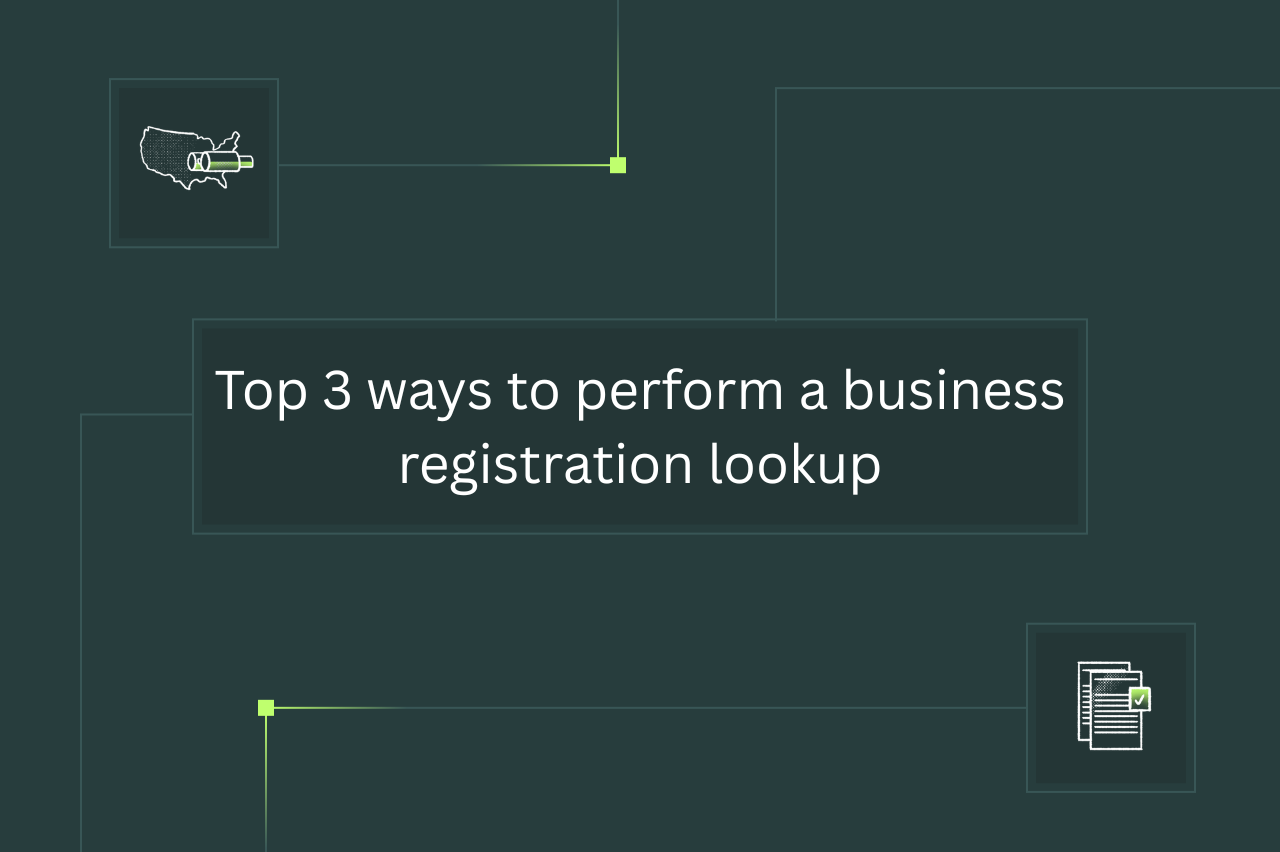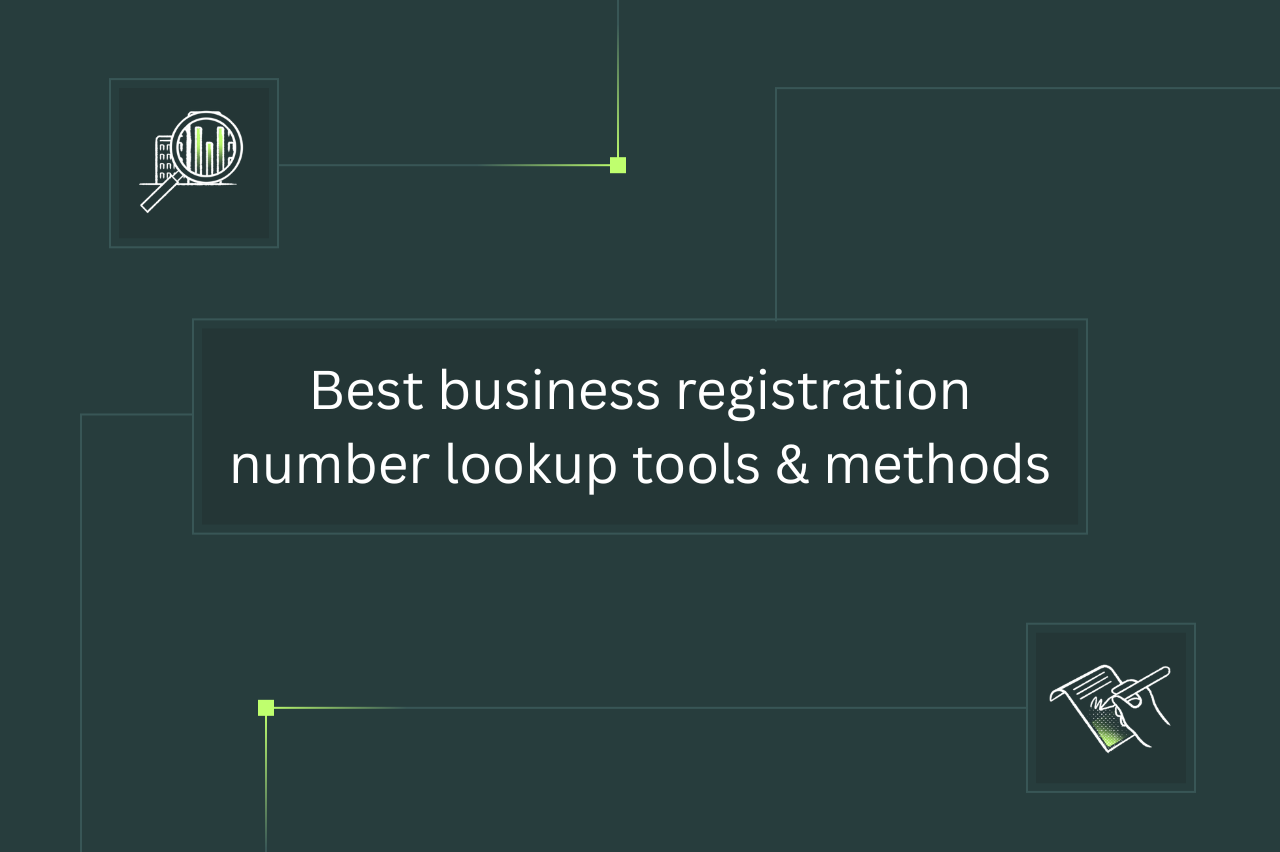In brief:
- Many types of businesses in the U.S. – LLCs, corporations, partnerships, and nonprofits – are required by law to register with state governments (and federal and/or local governments, in some cases).
- Companies should check that businesses they plan to onboard are registered. This is to verify the company exists, is representing itself truthfully, and is legally allowed to operate in the U.S. It’s also to ensure that the business has avoided unnecessary risks by taking advantage of the perks of registration.
- Business registration documents and information can most often be found at state Secretary of State offices, from the SEC, or by using automated third-party tools like Middesk.
When checking a U.S. business for authenticity and risk during B2B client or partner onboarding, a simple but important question to ask is: is the business registered with the applicable levels of government?
Most types of businesses are legally required to register with state – and perhaps also federal and/or local – governments before they begin operating. Some types of businesses – such as sole proprietorships – don’t have to register, but there are upsides to doing so anyway.
Knowing how to search for a business’s registration information is an important KYB step. This is not only for determining if a business is operating legally, or even actually exists. It’s also for seeing if the business is lowering its risk profile by taking advantage of the perks of being registered: increased findability, tax breaks, supplier discounts, and greater access to financial resources, to name a few.
This article will discuss how and why a company should do a U.S. business registration search during KYB.
- What is a business registration lookup?
- Why a business registration lookup is important for business verification
- 3 ways to do a business registration number lookup & certificate search
- Middesk helps you find what you need to onboarding new customers
We’ll begin by going into a bit more detail about what it means to look up a business’s registration details, and some reasons why it’s an important step for KYB.
A business registration lookup is a search for documentation that proves a business is formally registered with federal, state, and/or local governments. Generally, any business that is an LLC, partnership, nonprofit, or corporation must register at one or more levels of government.
Businesses register for other reasons, as well. Registering a business and its name builds brand credibility, protects owners from personal liability for business debts or losses, allows for writing off business expenses for tax purposes, and helps the business qualify for financing.
Looking up business registration information is critical for determining if a business is legitimate and finding out who owns a business.
When you’re looking up business data to make a decision on a B2B relationship, it’s crucial that the KYB data you’re sourcing is reliable and current.
{{gated-content-block="/insights/how-to-run-an-effective-kyb-vendor-test"}}
A business registration search, in terms of KYB (Know Your Business), has a dual purpose of helping to both verify the business’s identity and assess the risk of onboarding it as a client or partner. Here are some reasons why.
Avoiding legal liability
As mentioned, registration with state (and sometimes federal or local) governments is a legal requirement for many types of businesses in the U.S. Checking that a business is registered helps to determine that it actually is a business, and that it’s legally authorized to operate (including hire employees) where it’s located. A company doesn’t want to associate itself with an illegitimate business, for both legal and other risk-related reasons.
Confirming the business’s financial capabilities
Creating a business allows its owners to separate their personal finances from their commercial ones (at least to some degree). This is helpful for reducing liability, but it requires proving that the business actually exists. Knowing that a business slated for onboarding is registered means knowing that it’s able to perform commercial financial functions, like open business bank accounts, apply for business loans, and receive capital investments.
Checking the business’s fiscal viability
It’s easier to trust a business that’s registered, fiscally speaking, because it typically gets a number of perks that help it save money. One is writing off expenses, such as insurance premiums and employee benefits, for tax purposes. Another is securing discounted relationships with suppliers that may not be available to companies without proper documentation.
Knowing the business is findable and reputable
When a business is registered, it has at least some sort of presence in government records – and hopefully elsewhere online as well. So if your company can find it, other potential customers and partners can likely find it too. More importantly, they can more readily trust that the business is operating ethically instead of as a “get rich quick” scam that could vanish without warning.
There are several ways to check if a business is registered to legally operate in the U.S. Depending on a business’s ownership structure, you want to look for its Articles of Incorporation (if it’s a corporation), Articles of Organization (if it’s an LLC), or Partnership Agreement (if it’s a partnership).
Here are some places to perform a business registration number lookup.
1. State Secretary of State offices
The most likely place you’ll find a business’s registration information is at a state Secretary of State office. This is because, in the U.S., businesses are generally governed at the state level. Middesk has a portal that links to the Secretary of State office website for all 50 states, including DC; it can be reached by clicking on the link above.
While this is the traditional method for doing a U.S. business registration lookup, it has its share of complications. One is that the state in which a business was registered may not necessarily be where it primarily operates. For example, Google has its headquarters in California, but was actually incorporated in Delaware. This means you may have to search across multiple states, including in some counterintuitive ones.
Another is that there isn’t a standardized interface for each state’s Secretary of State business lookup system. So each one may have different search options and/or ways of displaying information. Finally, many of these systems require registering for an account and/or paying a fee before allowing access to the requested information.
2. SEC’s EDGAR
The Security and Exchange Commission’s Electronic Data Gathering, Analysis, and Retrieval (EDGAR) system is another place you may have luck conducting a business registration number search. It allows for searching company filings by company name or ticker abbreviation, CIK number (Central Index Key, a unique identifier for a business in the SEC’s database), associated individuals’ names, or keywords.
The catch is that this method will only work with businesses big enough to list their shares on public stock exchanges. So it may not be a viable solution for finding smaller businesses, such as contractors, if they aren’t publicly traded. Also be aware that current records only go as far back as 2001.
3. Automated third-party KYB system
In our opinion, the best option for doing a business registration certificate search is to enlist a dedicated business verification and risk assessment platform like Middesk. These solutions are usually configured to pull business-related data directly from relevant government agencies. So they’re able to search in multiple places at once, and you know the information is coming from an official source. They even automate parts of the process, which make it more feasible to verify businesses at scale.
Doing these searches manually is not sustainable for a growing business. Check out our on-demand demo for Middesk Verify below to see how we can accurately verify business registration with the IRS in seconds.
{{gated-content-block="/events/productdemo-verify-june-2025"}}
Knowing a U.S. business is properly registered is a very valuable piece of information during B2B onboarding – not only for verifying its identity (and that it actually exists), but also for ensuring it can take advantage of business-related perks to minimize unnecessary risk. Middesk’s Business Verification tool has you covered with automated searching of all state’s Secretary of State offices at once for business registration data – both the information itself and scans of the related documents.
But it doesn’t stop there. It can also pull up other essential identity and risk-related information at the same time. That includes tax IDs, watchlist hits (for the business or related individuals), industry classification, web presence, litigation, and more.
Get in touch with our sales team and book a demo to discover how Middesk can help you automate — and elevate — your company’s onboarding procedures.









